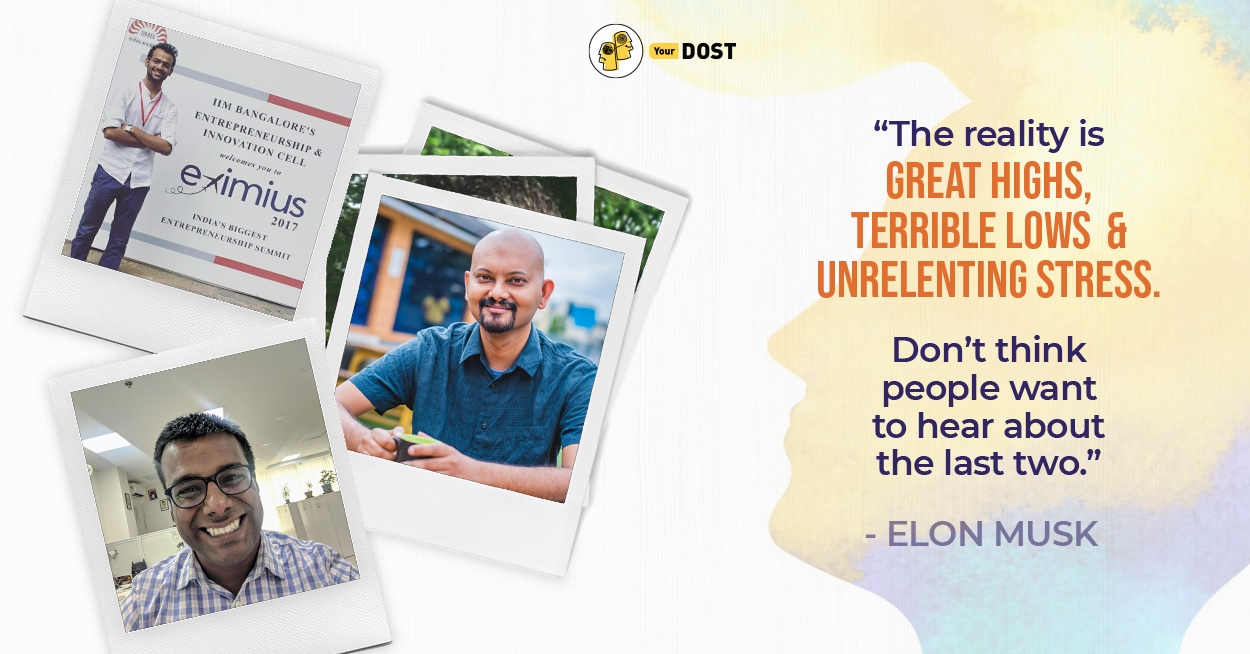The entrepreneur’s journey often appears smooth and simple from the outside. However, this notion seems to ignore one very important fact, that startup founders are human too.

In reality, The journey is a rollercoaster ride. When Elon Musk was asked about the ups and downs in his own life on Twitter, this was his reply –

Clearly there’s more to the entrepreneurial journey than meets the eye, right?
With the purpose of smoothening this rollercoaster journey, YourDOST designed the Founders Program. Each founder who signs up for this program is paired with a Coach (a professional psychologist trained in handling high-performing entrepreneurs), who helps them identify their core issues or areas to work, breaks the problem down into immediate goal(s) and works with them.
In the past 18 months, 250+ Indian founders have signed up for and benefited from this program. Would you like to know what their top queries were? Here goes:
Q – How do I deal with negative thoughts?

According to the ‘Encyclopedia of Behavioral Medicine’, negative thoughts are cognitions about the self, others, or the world in general that are characterized by negative perceptions, expectations, and attributions and are associated with unpleasant emotions and adverse behavioral, physiological, and health outcomes.
According to a 2018 study, thoughts and beliefs that are grounded in negativity also impact our feelings, emotions, and mental health negatively.
These harmful perceptions commonly contribute to the symptoms of mood and anxiety disorders. Entrepreneurs are quite vulnerable to these effects.
According to a 2019 study, 55% of Indian entrepreneurs aged 20-40 years report anxiety as the dominant feeling they experience.
Experts suggest the following tools and strategies to overcome negative thoughts:
Catch your cognitive distortions
Negative thoughts, over an extended time, tend to develop into cognitive distortions. You
The following illustration sheds some light on the different types of cognitive distortions we may fall victim to:

One very effective method to overcome cognitive distortions is Socratic Questioning, a very effective cognitive restructuring technique.

All you need to do is whenever you catch yourself preoccupied with a particularly negative ask yourself the following questions:
1. Is this thought realistic?
2. Am I basing my thoughts on facts or on feelings?
3. What is the evidence for this thought?
4. Could I be misinterpreting the evidence?
5. Am I viewing the situation as black and white, when it’s really more complicated?
6. Am I having this thought out of habit, or do facts support it?
Write your answers down if that helps. Overtime, you won’t need to consciously ask yourself these questions to overcome your negative thoughts. You’ll be able to catch them way before they spiral out of control.
Mindfulness
Mindfulness is a psychological process in which the individual purposely brings their attention to experiences occurring in the present moment without judgment. Think of it as exercise to develop a muscle which helps you become more aware of your feelings, emotions, sensations, etc. without judging them. As you practice mindfulness more and more, you develop this muscle so that you don’t have to put much effort into being more aware of your experiences in the present.
According to a 2015 study at Carnegie Mellon University, mindfulness can help us become more attentive to our own emotions.
With this improved awareness, we’re able to catch our negative feelings as soon as they arise, and accordingly engage in positive remediation rather than dwelling on the negative thought.
Here’s a simple companion guide to practice a mindfulness technique called body scan meditation, to practice along with:
Q – How do I manage my time and prioritize tasks?

As a founder recently said –
Founders usually carry more on their plate than they can possibly digest
He’s not wrong. “I’m always running out of time” is a very common complaint that most entrepreneurs complain of.
According to a 2016 research study, an entrepreneur, on average, spends 68.1% of their time working “in their business” i.e.tackling day-to-day tasks, managing crises, etc. They end up spending only 31.9% of their time working “on their business” i.e. long-term goals, strategic planning, etc.
Clearly this isn’t ideal, particularly when it comes to ensuring future business growth and success. Some tips that Experts have to overcome this very significant issue are:
Prioritisation
It is not enough to be busy. So are the ants. The question is: What are we busy about? – Henry David Thoreau
For most people, particularly founders, everything in your todo might seem equally important. So how does one prioritise the tasks at hand? The answer is the “Eisenhower Matrix”

As per this matrix, all the tasks in your todo will fall into one of the 4 quadrants:
Q1 – High Importance, High Urgency. Eg. A sales meeting with a potential client
Q2 – High Importance, Low Urgency. Eg. Interacting with team members, or an internal All-Hands/town hall meeting
Q3 – Low Importance, High Urgency Eg. An investor update which has been pending for a while 🙂
Q4 – Low Importance, Low Urgency Eg. Reading all-the-news on COVID-19!
At this point, it’s important to point out what’s the difference between importance and urgency.
Any task that requires immediate attention, tasks that scream “Now!” and put us in a reactive mode are defined as Urgent.
On the other hand, tasks that contribute to our long-term mission, values, and goals are defined as Important.
Once you’ve distributed your tasks into this matrix, you will also know how to prioritise them, the order being Q1->Q2->Q3->Q4.
Note: A very important point to note here is that at the get-go, if most of your tasks seem to fit in Q1 then your time management certainly needs an overhaul. When you find that most of your tasks find their place in Q2, know that you’re getting your priorities right.
Improve delegation

As an entrepreneur, wouldn’t it be awesome if you could handle all tasks at hand on your own? It feels great to be personally in control of everything that needs to be done. But ultimately, you’re 1 person, and it’s impossible to accomplish everything alone. That’s where delegation comes into the picture. Delegation refers to the assignment of authority to another person to carry out specific activities. To be a successful entrepreneur and effective time manager, it’s important that you know how to effectively delegate tasks.
According to a 2015 study, companies led by CEOs who are also strong delegators achieved a higher overall growth rate as opposed to companies whose CEOs delegated less.
This study also found that only one in four entrepreneurs display high levels of delegation talent.
For effective delegation, it is advisable to follow the 6 Ts’s:
1. Tiny: You know those small tasks that only take a tiny amount of time but tend to pile up over time? These can be easily delegated.
2. Tedious: Tedious tasks are mindless tasks that require little skill and are also easily delegated.
3. Time-consuming: Huge, time-consuming tasks, particularly those which are also time sensitive, provide an opportunity to be broken into smaller chunks and then you choose to take care of certain chunks on your own and delegate others, thus reducing the amount of time it takes to complete them.
4. Teachable: Is there a task on your plate that could be easily taught to someone else? Teach them. Now you can delegate the task to them in the future too.
5. Terrible at: Just because you’re an entrepreneur doesn’t mean you’re good at everything. If you come across a task which doesn’t match your skill set, delegate it without a second’s thought.
Q – How do I improve my personal relationships?

One of the commonest and well-known aspects of entrepreneurial life is the toll it can take on one’s work-life balance and consequently, their personal relationships.
According to a 2017 study, the biggest challenge that the majority of entrepreneurs face is work-life balance.
Healthy personal relationships are an essential part of people’s lives. Research shows that these relationships help us live healthier lives and even extend the longevity of our lives. Most importantly, they help us get better at coping with stress. This was proven by a study in which researchers found that when a person is reminded of someone with whom they have a strong relationship, after completing a stressful task, they experience faster recovery from the said task.

Considering how stressed the lives of entrepreneurs are, personal relationships are clearly a crucially important factor of their lives.
When it comes to improving those relationships, the following techniques are advisable:
Active Listening

Active listening is a technique that is used in counseling, training, and solving disputes or conflicts. It requires that the listener fully concentrate, understand, respond and then remember what’s being said.
Research suggests that active listening helps others feel more understood, and improves relationship satisfaction.
The best part about this technique can be used with most people in your life – employees, spouse/partner, children, mentors, etc.
Here’s how you can be an active listener:
1. Verbal Acknowledgement – As you’re listening to the other person, use verbal cues like “sure”, “I see”, “indeed”, etc. This provides the speaker with reinforcement that you are attentive, and encourages them to continue.
Caution : While these verbal cues are important, use them sparingly so as not to distract from what is being said or place unnecessary emphasis on parts of the message.
2. Non-Verbal Cues – Make proper eye contact, keep your posture alert, and use appropriate gestures such as nodding, to demonstrate that you are listening.
3. Paraphrasing – Repeat or paraphrase what the speaker has said in order to show comprehension. This is a powerful skill that can reinforce the message of the speaker and demonstrate understanding. Eg. “So what you’re saying is that even if we can’t meet because of lockdown, we can continue our weekly hangout over Zoom”
4. Clarification – Clarification helps you better understand and give value for the person’s speech. Clarification usually involves the use of open questions, raised politely, and enables the speaker to expand on certain points as necessary. Eg. “Could you explain what you meant by…?”
Caution : Do not interrupt the speaker. Ask your questions only once they’re done speaking.
5. Summarization – Summarization helps you extract the important information in the discussion, as well as convey the message of active listening to the speaker. It involves taking the main points of the received message and reiterating them in a logical and clear way, giving the speaker a chance to correct themselves if necessary.
Build Assertiveness

Assertiveness is defined as one’s ability to express their feelings, opinions, beliefs, and needs directly, openly and honestly, while not violating the personal rights of others. If you lack assertiveness skills, it can adversely affect your ability to express your feelings honestly and openly. This can be quite problematic, particularly when it comes to building a relationship or communicating with friends, family members, or co-workers.
According to one 2011 study, assertiveness is not only an important communication skill, but also represents a way of constructively coping with stressful interpersonal situations.
Here are some simple tips to be more assertive in personal relationships:
1. Talk openly and honestly about your feelings – Assertive people never let problems fester. Instead, they talk about them and sort them out early on. If there is an interpersonal problem that you’re dealing with, this involves openly and honestly explaining exactly why there is a problem.
2. Express gratitude – All relationships are about give and take. Saying thank you for a something that the other person did for you, no matter trivial it might be, further strengthens your relationship with that person and also demonstrates that you do not take them for granted
3. Don’t apologize unnecessarily – Contrary to Elton John’s famous song, sorry isn’t really the hardest word anymore. We often find ourselves apologising in uncomfortable situations involving others, in an attempt to ease tension. Unfortunately, it doesn’t have the intended effect. According to studies, apologising like this can lessen the impact of future apologies, and more alarmingly, reduce other people’s respect for you.
This discussion barely scratches the surface of the issues that entrepreneurs have discussed with their coaches as a part of the Founders Program. If you’re an entrepreneur and have your own issues which you would like some professional guidance with, sign up for the Founders Program. Click here for more info.



